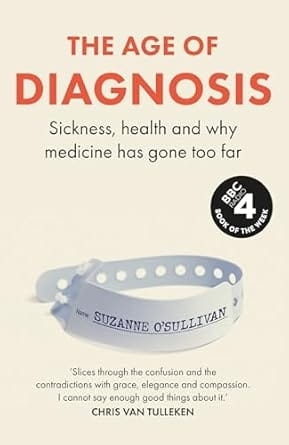Chris van Tulleken, author of ULTRA-PROCESSED PEOPLE:
The Age of Diagnosis covers so many topics that have been troubling me but which I hadn't been able to resolve myself. It slices through the confusion and the contradictions that have tied me in knots - both as a parent and as a clinician - with grace, elegance and compassion. It is scholarly and human, but an absolutely absorbing read from start to finish. There are very few people who could write this so straightforwardly and yet with endless compassion. I really cannot say good enough things about it.
Elizabeth F. Loftus, Distinguished Professor, University of California, Irvine:
O'Sullivan explodes conventional wisdom about medical diagnoses. She knows that having a diagnosis like autism, or ADHD, or depression, or Lyme disease, can give her patients relief at having an explanation. But she also invites us to wonder where these diagnoses came from. Are we over diagnosing? Is this really the best strategy for helping people get better? With clarity of prose and reasoning, The Age of Diagnosis should make all of us think about whether we are more or less healthy when we receive a diagnostic label.
Sathnam Sanghera:
In my view the best science writer around - a true descendant of Oliver Sacks.
Henry Marsh:
A brave and deeply compassionate book with a very important message.
Gavin Francis, author of ADVENTURES IN HUMAN BEING:
A book of great wisdom as well as compassion - the result of decades working along the frontiers of brain, mind and body. Modern medicine is powerful; with care and with stories from her clinic, Dr O'Sullivan shows just how harmful it can be too.
Christie Watson, author of THE LANGUAGE OF KINDNESS:
I loved this beautifully written and provocative book. The Age of Diagnosis asks brave and important questions, taking on the medical establishment as well as contemporary societal norms. O'Sullivan's primary motivation in her writing, her philosophy and her work as a doctor is extreme empathy and advocacy for her patients.
The Times books to look out for in 2025:
The neurologist Suzanne O'Sullivan has written insightful books about psychosomatic conditions. Here she turns her attention to the perils of over-diagnosis - including autism, allergies, ADHD and long Covid. Be prepared for compassionate and bracingly independent thinking.
Tessa Hadley:
How does she carry off that high wire act, being so technical and expert and grounded in data, while telling stories in a way that makes them utterly addictive? I love the way she listens to people talking. It's a really important, intelligent, compassionate and brave book, and it speaks very eloquently to things happening in our ideas about ourselves.
James Le Fanu, Literary Review:
'O'Sullivan impressively marshals evidence of how drivers of 'overmedicalisation' have arisen, the minimal benefits conferred and the harms that can result. Most striking is her examination of the explosion in diagnoses of mental health conditions, such as autism and ADHD... O'Sullivan seeks out the 'reality' behind appearances, though her scepticism is tempered with sympathy and understanding... So entrenched has overmedicalisation become that there now seems no prospect of its being reversed. O'Sullivan's masterful diagnosis of how this has come about is immensely persuasive.'
Hannah Barnes, New Statesman:
'Exceptional... Chapter by brilliant chapter, [The Age of Diagnosis] raises fundamental questions we should all be asking when thinking about illness, be it cancer or genetic disorders, never shying away from difficult truths.'
Adam Rutherford, The Guardian:
These are incredibly difficult areas to explore...O'Sullivan is brave to take this subject on, and she hits the target... O'Sullivan is an excellent, fluid writer, and an eloquent speaker... In a world where medical misinformation and disinformation flourish, and people die as a result, it takes courage to counter them without pandering to stereotypes. But that is what The Age of Diagnosis does so well... Its overall message is clear: diagnosis is a tool to be wielded with the utmost caution, and tolerance for difference and for imperfection can go a long way in keeping us healthy.

